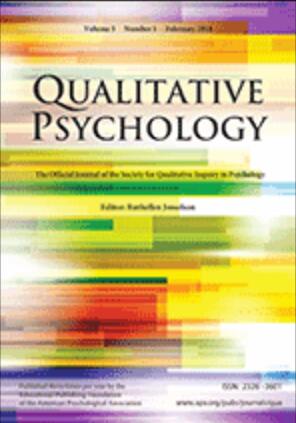Alternative Pathways to Activism: Intersections of Social and Personal Pasts in the Narratives of Women’s Rights Activists
IF 14.3
Q2 Psychology
引用次数: 10
Abstract
We examined pathways to activism, focusing on the narratives of women’s rights activists who grew up in different places and times, using interview transcripts from the Global Feminisms Project archive. The findings reveal that experiencing a socially or personally disruptive event (e.g., a war or loss of a daughter due to domestic violence, respectively) facilitated activism at different stages of life in unique ways; and there were specific catalysts for activism for each stage. Those who grew up under oppressive regimes thought activism was the most “natural” response to what was going on sociopolitically; for them, feelings of freedom and strength were the catalyst. Those who experienced a disruptive event in their adolescence viewed their activism as intertwined with their personal identity; for them, love, support and togetherness were the catalyst. Finally, those who experienced disruption in their adulthood viewed their activism not as identity, but simply as action. They made sense of these actions by tracing the continuity in their lives; and for them, small political acts and accomplishments were the catalyst. The relationship between politicized identity and personal identity, as well as the bidirectional relationship between activist involvement and politicized identity is discussed in light of these findings.行动主义的替代途径:妇女权利活动家叙事中社会和个人过去的交叉点
我们研究了行动主义的途径,重点关注在不同地方和时代长大的女权活动家的叙述,使用了全球女权主义项目档案的采访记录。研究结果表明,经历社会或个人破坏性事件(例如,战争或因家庭暴力而失去女儿)以独特的方式促进了生活不同阶段的行动主义;每个阶段的行动主义都有特定的催化剂。那些在专制政权下长大的人认为,激进主义是对社会政治状况最“自然”的反应;对他们来说,自由和力量的感觉是催化剂。那些在青春期经历过破坏性事件的人认为他们的激进主义与他们的个人身份交织在一起;对他们来说,爱、支持和团结是催化剂。最后,那些在成年期经历过混乱的人并不把他们的激进主义视为身份认同,而仅仅是一种行动。他们通过追踪他们生活中的连续性来理解这些行为;对他们来说,小小的政治行动和成就是催化剂。在此基础上探讨了政治认同与个人认同之间的关系,以及积极分子参与与政治认同之间的双向关系。
本文章由计算机程序翻译,如有差异,请以英文原文为准。
求助全文
约1分钟内获得全文
求助全文
来源期刊

Qualitative Psychology
Psychology-Psychology (all)
CiteScore
7.80
自引率
0.00%
发文量
15
期刊介绍:
The mission of Qualitative Psychology journal is to foster innovative methods, theories, and empirical research in qualitative inquiry within psychology. The journal aims to highlight the unique contributions of qualitative research in advancing psychological knowledge. Published studies not only explore substantive topics but also address issues related to epistemology, the philosophy of science, and methodological criteria that impact the formulation, execution, and interpretation of qualitative research.
Qualitative Psychology promotes a diverse range of methodological approaches, including narrative, discourse analysis, life history, phenomenology, ethnography, action research, and case study. Additionally, the journal puts emphasis on discussing the teaching and training of qualitative research methods to develop competent qualitative researchers.
 求助内容:
求助内容: 应助结果提醒方式:
应助结果提醒方式:


